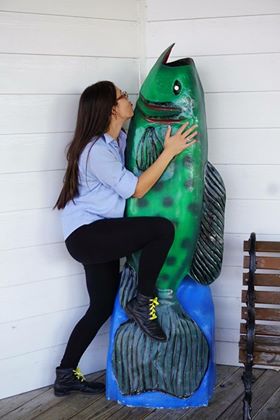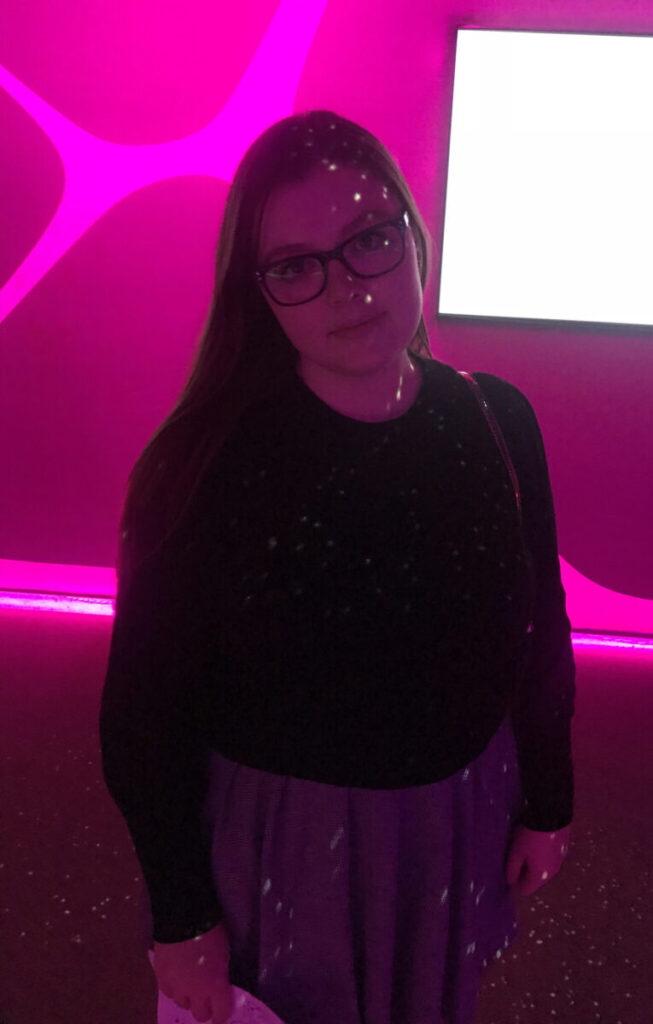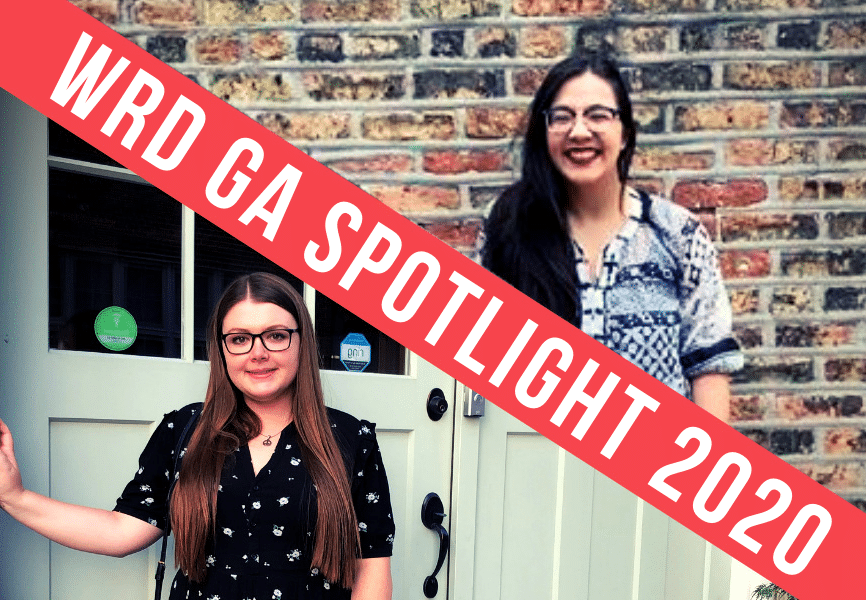As the academic year comes to an end, the WRD Blog sees a changing of the guard with the graduation of some of its writers. This time around, graduate assistants Megan Palmer and Maddy Crozier take their leave, each moving on to pursue their goals. Megan, in charge of external communications, is seeing the end of her second year with the department and is moving on to the job market; meanwhile, Maddy–as part of the BA/MA program for WRD–is going on to pursue further education after a year with the staff.
With their graduation, we’ve felt the need to talk with them about their time with the blog, asking why they originally chose WRD, their paths through it, and what their futures may hold.
What originally led you to WRD?
Megan Palmer: During my undergraduate program in English Language and Literature, I couldn’t help but feel like there was something missing. I knew I wanted to pursue a master’s but I couldn’t nail down exactly what in.
As I was taking stock of options and programs, I realized that all the teachers I admired most, all the mentors who really seemed to have some of the puzzle pieces I was missing, had educational backgrounds in programs that had some kind of rhetoric and composition focus.
What led me specifically to the Writing, Rhetoric and Discourse program, however, was more a series of well lined up accidents and coincidences. I had some friends in Chicago, someone mentioned they thought DePaul had a program that might line up with my interests, there was an a cappella barbershop chorus in the area I really wanted to join.
Maddy Crozier: When I came to DePaul in Fall 2015 as a freshman journalism major, I had no idea that our university has one of the only rhetoric and composition-focused programs in Chicago. Since I really didn’t know how unique that was, I have to agree with Meg that my path to the program was lined with luck and coincidences.
After realizing that journalism wasn’t for me and I needed to switch majors as an undergraduate, I took classes in two of what I perceived as the most writing-focused departments: English and WRD. At the time, I was focused on professional and digital writing and I was also interested in sociolinguistics, so I decided to aim for the Combined BA/MA program. I could not have found a better community in which to learn and a better discipline in which to find my passions.
Are there any blog posts that you look back on, or any projects perhaps?

Megan Palmer: I really enjoyed the work I got to do with alumni the past two years. I like talking to people, and alumni work is a nice reminder that there is a world after graduation. Working on WRD’s alumni database was also incredibly rewarding. To see the kind of work alumni are doing, to find patterns in jobs and sectors was really exciting, as well as–I think–beneficial to the department. It’s nice to know the work you do will have some lasting meaning beyond your time in the program.
Maddy Crozier: One of my favorite projects involved helping create a Current MAWRD Students page on the WRD website. The page features profiles of some of our current graduate students, showcasing their interests, talents, and goals. Our WRD community spans a range of diverse perspectives, and places we’ve come from and places we’re going, and we all have so much to learn from each other as much as our instructors. I feel proud to see a space dedicated to celebrating our students in a public-facing forum.
Now that you’re moving on, what are your plans?
Maddy Crozier: In the Fall, I am going to start a PhD program at the University of Tennessee Knoxville. The program is a PhD in English with a Concentration in Rhetoric, Writing, and Linguistics, and I’ll be teaching first-year composition in the university’s writing program.
The foundation of knowledge and skills I have built through WRD has prepared me so well for the next phase of my education as I work toward a career in writing program or writing center administration. My time in the WRD program has given me opportunities to change as a student and a learner, exploring new ways to approach writing and communication with curiosity, skepticism, and genuine openness. My thinking and learning dispositions and my motivation have been sharpened through WRD, which prepares me well to continue my graduate studies.
So, at this moment, I don’t exactly feel like I’m “moving on” because I will continue to think and act with the lessons I’ve learned in WRD, and I know that my faculty mentors will continue to support me in this next chapter. I feel privileged to have so much guidance as I try to figure out who I might be as a first-year composition instructor.

Megan Palmer: Haha, when I know, the WRD Blog will be the first to know. Job searching in a pandemic isn’t exactly the most fun thing in the world, but I’m trying to look at it as an opportunity for reflection and focusing.
The effects of COVID-19 as well as recent events affecting black and brown communities across America has provided many people a look at many of the structural inequalities and inefficiencies in our country. A lot of people want to help, but maybe aren’t in a position to quit a job, change careers, uproot their lives for what I call “the work.” Not the work we do at just any job, but the work that we do to make the places and communities we live in better, more sustainable, more equitable, and more just.
So, while the global pandemic means I don’t have an answer to this question just yet (I’m sure to the dismay of those keeping track of alumni news, oh wait! That’s me!), it does mean that I have a unique opportunity to reflect on what I think is important, what skills I have, and how I can most effectively aim them at initiatives and work that supports my community and the people living in it.
Do you have any final comments to make about your experience with the department?
Maddy Crozier: I am truly endlessly grateful for everyone in our WRD community who has taught me, mentored me, and challenged me over the last few years. I have forged lasting bonds with some of my peers and instructors that I know will support and strengthen me throughout my studies and career. With gratitude and sincerity, thank you all.
Megan Palmer: One of the main purposes of grad school, I think, is that you become uncomfortable. Restless. Itchy for knowledge and growth. Insatiable and reflective. If you’re not just a little bit uncomfortable, you’re doing it wrong. If you’re not also unlearning things, you’re not really listening and reflecting. I am grateful to the WRD program for giving me space to grow and learn, and for connecting me with the greater Chicago community where I could put my actual skills and values into practice.
